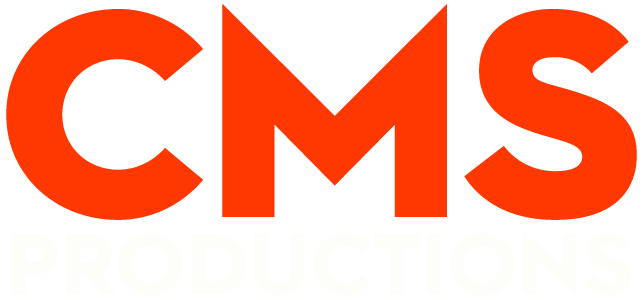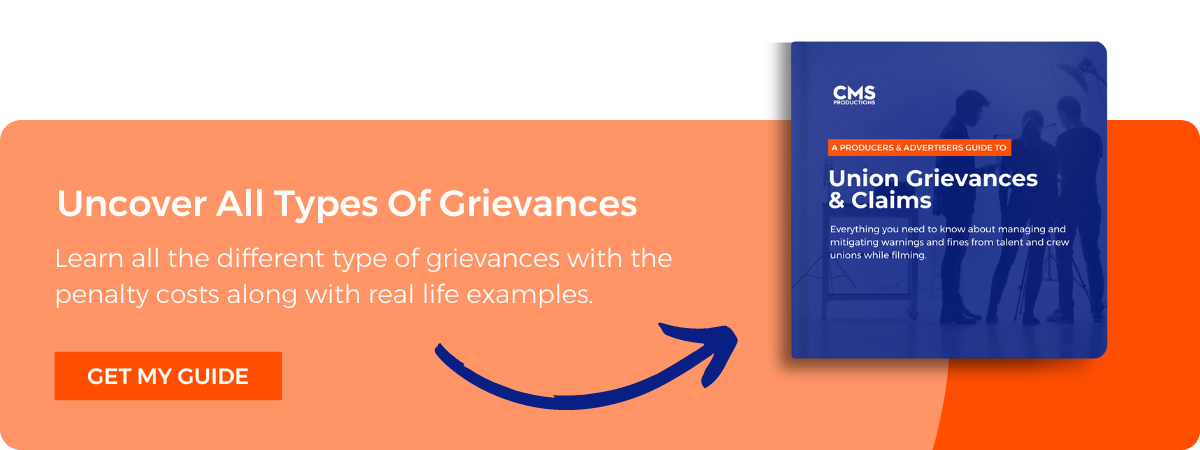Navigating Film Union Grievances and Claims
Beneath the glamor of the film world, there is a complex web of rules and agreements that holds your team in order; that is, a framework designed to protect the rights of every actor and crew member involved. Working with union talent and crew from entertainment unions like SAG-AFTRA, DGA and I.A.T.S.E. require you to follow strict union rules and regulations during production to ensure fair working conditions.
Whether you’re a new producer on your first project or an experienced professional, there are many ways to encounter union-related bumps along production that can affect your production budget.
Continue reading as we outline essential union rules and regulations for talent and crew every producer should know about to prevent disputes and ensure a seamless production.
What Is a Union Grievance or Claim?
When a crew member reports to their union, they file a grievance. When a talent member reports an issue to their union, they often file a claim. Union grievances or claims are filed on behalf of the crew for several reasons, including:
Late payments of wages
Benefits not contributed or allocated to employee''s accounts
Production not abiding by union contract terms
Hiring of “non roster” crew members
Addressing grievances or claims as soon as possible is crucial to mitigating disputes before they escalate. While some reports can be resolved quickly, others may become serious enough to result in added penalties.
Step-by-Step: What To Do When You Receive a Grievance or Claim
What happens when a grievance or claim arises? Here, we will outline how grievances or claims progress within productions and how your team should effectively address the situations.
Informal Warning
Before the union files an official claim or grievance against your production, they will first reach out directly to the company to ask questions and investigate into the report.
At this stage, it is highly encouraged to work closely with the union to mitigate the complaint as this initial warning can further escalate to a formal grievance or claim.
Pre-Grievance Notification
If the union verifies a breach on their terms and conditions, they will send the signatory a grievance letter with further information about the issue. Often they will request payroll and related production records.
At this stage, you can resolve the grievance or claim through settlement. We highly encourage to not let the grievance go beyond this point to avoid added penalties or production delays.
Ultimately, you can never ignore a grievance… it will never go away.Grievance Letter
If your company fails to address the grievance or claim, the union will send a formal letter, outlining their reasons, as their final notice. The letter warns the risk of arbitration if your company fails to settle by a timely date. They will often request additional information and suggest a remedy.
At this stage, we strongly recommend resolving the grievance or claim as soon as possible to prevent further production delays and protect the valuable industry relationships. After this means arbitration which means legal fees.
Arbitration
In the final stage, lawyers from both parties will become involved, which can quickly become expensive. In most if not all cases, the cost of involving lawyers surpasses the original settlement amount.
Therefore, we strongly suggest resolving the grievance or claim as soon as possible to protect your production.
Types of Grievances and Claims & Penalty Costs
Grievances or claims can occur for a number of reasons, from common issues such as breach of fair working conditions to more specific concerns such as jumping budget tiers. The most common union crew grievances are associated with the hiring of non-union members to do union covered work. Each grievance or claim carries their own set of penalties that can impact your production budget.
In this section, we cover the most common types of grievances or claims your production may encounter along the way.
Grievances
Wage Disputes
Wage disputes include late payments or incomplete payments to union members. SAG-AFTRA sets minimum wage rates for its members with set deadlines for each project. Failure to pay the complete amount on time can result in a grievance.
Penalty: Payment of back wages owed, potentially with interest, and additional fines.
Use of Non-Union Labor
Employing non-union workers for roles that are supposed to be filled by union members. SAG-AFTRA has a clear policy that states if you hire one union member, all members must be union. This includes crew production members.
If your project depends on non-union workers, the producer can also fill out a SAG-AFTRA Taft Hartley form to justify hiring a non-union member on a union job. Without a Taft Hartley, your production can face a grievance.
For crew productions, you can submit a waiver to the local union that covers that position. Submitting a waiver does not guarantee that it will be approved. If the union local does not approve, production must use a union member.
Penalty: Payment of damages of total cost of non union members plus benefits (double pay penalty). Payment for damage and fringes is an extra 45%.
Jumping Budget Tiers
When your budget starts their project in a specific tier and throughout production, your budget goes up but does not get reported. This is considered “jumping budget tiers” and can result in a grievance and if there is a “tier jump” it will be expensive.
Penalty: Pay increased wages to crew based on tier.Other Types of Grievances
Working Hours and Conditions
Contract Breaches
Residuals and Royalties Issues
Improper Processing or Payment of Health & Pension Benefits
Credit and Publicity Violations
Discrimination and Harassment
Failure to provide Appropriate Accommodations
Improper Use of Performances
Failure to Follow Staffing Requirements
Claims
Misclassification of Crew
Paying union crew members as independent contractors to avoid union-mandated benefits and protection can result in a claim.
Penalty: Required back payment of benefits, imposition of fines, and legal consequences.
Upgrade Claims
Upgrade claims arise when talent, such as an extra, believes their role was significant enough to warrant being classified as a principal actor.
Penalty: Paying for additional usage cycles, often as higher renegotiated rates, and possibly incurring substantial fines or legal costs.Late Payments
Delays in paying crew or talent is a quick way to encounter a claim.
Penalty: If a claim is filed with the CA Labor Board penalty imposed can be the day rate x the number of days late, capping at around 30 days. There can be additional fees for prolonged non-payment. This can get really expensive and open the possibility of class action lawsuits.Other Types of Claims
Unfair Labor Practices
Neglecting Health and Safety Standards
Violating Collective Bargaining Agreements
Withholding Contractual Benefits
Inadequate Overtime Compensation
Ignoring Contract Termination Clauses
Non-Payment of Royalties
Unauthorized Use
Preference of Employment or Taft-Hartley Violations
Working Condition Claims
Conclusion: Avoid Union Grievances and Claims Through Third-Party Union and Crew Signatory Support.
In conclusion, there is a lot to know about union contract rules and regulations to ensure a seamless production journey without any grievances or claims.
Working with a third-party union signatory company can step in and mitigate any disputes before they arise.
CMS is a third-party signatory to the SAG-AFTRA Commercial, Corporate Educational / Industrial & Interactive media contracts. We are signed directly to the AICP I.A.T.S.E. and Teamsters 399 (LA) and 817 (NY) agreements and can service on almost all kinds of productions.
Contact us today to set up a consultation.




